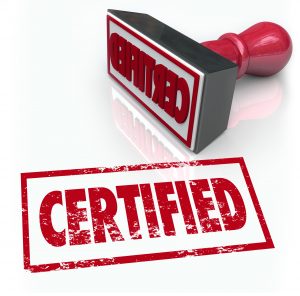 If you’re looking to advance in the EHS industry, pursuing a certification is a great way to grow your career. Earning a certification helps you stand out as a professional who wants to be a leader at work and distinguishes you as a high-performance candidate if you’re searching for a new job. When you gain a certification, it opens you up to more career opportunities, including promotions and a higher salary.
If you’re looking to advance in the EHS industry, pursuing a certification is a great way to grow your career. Earning a certification helps you stand out as a professional who wants to be a leader at work and distinguishes you as a high-performance candidate if you’re searching for a new job. When you gain a certification, it opens you up to more career opportunities, including promotions and a higher salary.
Here are some EHS certifications that are in demand by a variety of employers:
1. Associate Safety Professional (ASP): This certification is designed for professionals who perform at least 50 percent of professional-level safety responsibilities. These duties include conducting audits, providing safety training, filing OSHA 300 logs for reporting workers’ injuries and implementing industrial hygiene programs. The ASP certification is provided by the Board of Certified Safety Professionals (BCSP). In order to take the ASP exam, you must have:
- One year of safety experience with safety being at least 50 percent preventative, professional level
- A bachelor’s degree in any field, or an associate’s degree in a safety, health or environment field.
2. Certified Safety Professional (CSP): Like the ASP, the CSP certification is designed for professionals who perform at least 50 percent of professional level safety responsibilities, such as assessing worksites to determine risks and possible hazards, developing emergency response plans and investigating safety incidents. This certification is also from the BCSP. In order to take the CSP exam, you must have:
- At least four years of professional safety experience with safety being at least 50 percent preventative, professional level
- A bachelor’s degree
- One of the following credentials: ASP, CIH, CMIOSH, CRSP, GSP, SISO, MISPN.
3. Certified Hazardous Materials Manager (CHMM): The CHMM certification is a professional designation for handling hazardous materials, sampling air, water and soil waste for possible contaminants, responding to hazmat emergencies, and more. This certification is provided by the Institute of Hazardous Materials Management (IHMM). The requirements to take the CHMM exam are:
- A bachelor’s degree
- At least four years of relevant experience in the hazardous material management field or a similar field.
4. Certified Industrial Hygienist (CIH): This certification is geared toward professionals with work responsibilities like air sampling and instrumentation, ergonomics and toxicology. The CIH exam is administered by the American Board of Industrial Hygiene (ABIH). To qualify to take the CIH exam, you must have:
- A bachelor’s degree within a science discipline
- Specific industrial hygiene coursework
- At least four years of industrial hygiene experience
- Experience with at least two of the following occupational health stressors: chemical, physical, biological or ergonomics
- Two professional references.
5. Certified Professional Environmental Auditor (CPEA): The CPEA certification demonstrates a professional’s understanding of environmental, health and safety laws. This certification has four specialties to choose from: Environmental Compliance, Health & Safety, Management Systems, Responsible Care. The CPEA exam process is administered by the Board of Environmental Auditor Certifications. To take the CPEA exam, you must have:
- A bachelor’s degree
- Four years of relevant work experience
- Meet the audit experience and training requirements for your certification specialty
- Two character references.
6. Construction Health and Safety Technician (CHST): The CHST certification is designed for professionals who exhibit competency and work in health and safety activities dedicated to the prevention of construction injuries and illnesses. CHST certification candidates are usually employed as safety and health specialists who work on construction job sites. The CHST is provided by the BCSP. The requirements to take the CHST exam are:
- You work in construction safety and have responsibilities that require technical skills and knowledge in health and safety
- You have three years of experience working in construction health or safety.
7. Safety Trained Supervisor Construction (STSC): The STSC certification, provided by the BCSP, is geared toward leaders at all levels of a company. These professionals might not have safety as their main responsibility, but their knowledge of safety best practices ensures a safer work environment. In order to take the exam for this certification, you must have:
- 30 hours of safety, health and environmental training
- Two years of supervisory experience or four years of work experience related to construction.
8. Occupational Hygiene and Safety Technician (OHST): The OHST certification is designed for professionals who perform occupational health and safety work. This certification exam is administered by the BCSP. In order to take the exam for the OHST, you must:
- Work in the occupational hygiene or safety industry and have responsibilities that require technical skills and knowledge in occupational health or safety
- Have three years of experience in occupational hygiene or safety.
9. Safety Trained Supervisor (STS): This certification is for leaders at all levels of a company. These professionals might not have safety as their main responsibility, but their knowledge of safety best practices ensures a safer work environment. The requirements to take the exam for this certification, administered by the BCSP, are:
- 30 hours of safety, health, and environmental training
- Two years of supervisory experience or four years of experience in any industry.
10. Certified Environmental and Safety Compliance Officer (CESCO): This certification is designed for individuals to verify that they understand the basic and most important laws regarding air, water, waste water pollution, solid and hazardous wastes, and safety. It is provided by the National Registry of Environmental Professionals (NREP). In order to take the CESCO exam, you must have:
- A minimum of HAZWOPER 40 HR training, OSHA 10/30 HR training or a bachelor’s degree
- Two years of full-time employment conducting environmental and/or safety duties.
Others You Might Consider
Certified Safety Director® (CSD): Offered through the National Association of Safety Professionals (NASB), this certification was accredited by the ANSI National Accreditation Board (ANAB) in June 2021. CSD certification is intended for those in a safety leadership position who work with minimal supervision and generally give direction to others.
Master Safety Professional® (MSP): Offered through the National Association of Safety Professionals (NASB), this certification was accredited by ANAB in June 2021. MSP certification is intended for those involved in the development and implementation of a comprehensive facility-wide or corporate safety and health program and are influential with senior management and policymakers.
Pursuing a certification is a great way to strengthen your skills in a particular EHS field and stand out in your career. Individuals who hold certifications typically have more professional opportunities and earn a higher salary. Consider working toward gaining an EHS certification to help you do your job more effectively and excel in your career.




